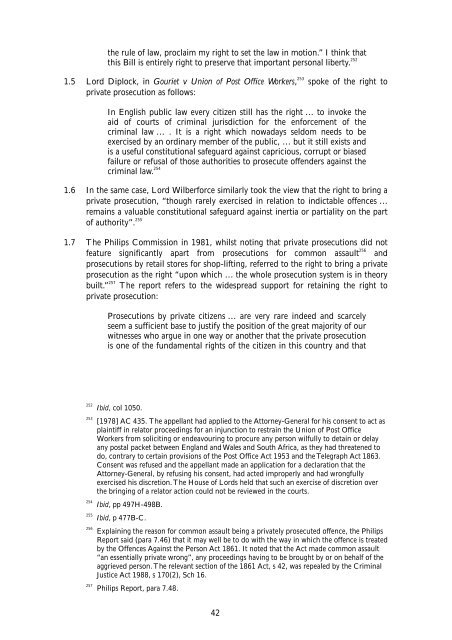cp149 Consents to Prosecution consultation - Law Commission
cp149 Consents to Prosecution consultation - Law Commission
cp149 Consents to Prosecution consultation - Law Commission
You also want an ePaper? Increase the reach of your titles
YUMPU automatically turns print PDFs into web optimized ePapers that Google loves.
the rule of law, proclaim my right <strong>to</strong> set the law in motion.” I think that<br />
this Bill is entirely right <strong>to</strong> preserve that important personal liberty. 252<br />
1.5 Lord Diplock, in Gouriet v Union of Post Office Workers, 253<br />
spoke of the right <strong>to</strong><br />
private prosecution as follows:<br />
In English public law every citizen still has the right … <strong>to</strong> invoke the<br />
aid of courts of criminal jurisdiction for the enforcement of the<br />
criminal law … . It is a right which nowadays seldom needs <strong>to</strong> be<br />
exercised by an ordinary member of the public, … but it still exists and<br />
is a useful constitutional safeguard against capricious, corrupt or biased<br />
failure or refusal of those authorities <strong>to</strong> prosecute offenders against the<br />
criminal law. 254<br />
1.6 In the same case, Lord Wilberforce similarly <strong>to</strong>ok the view that the right <strong>to</strong> bring a<br />
private prosecution, “though rarely exercised in relation <strong>to</strong> indictable offences …<br />
remains a valuable constitutional safeguard against inertia or partiality on the part<br />
of authority”. 255<br />
1.7 The Philips <strong>Commission</strong> in 1981, whilst noting that private prosecutions did not<br />
feature significantly apart from prosecutions for common assault 256<br />
and<br />
prosecutions by retail s<strong>to</strong>res for shop-lifting, referred <strong>to</strong> the right <strong>to</strong> bring a private<br />
prosecution as the right “upon which … the whole prosecution system is in theory<br />
built.” 257<br />
The report refers <strong>to</strong> the widespread support for retaining the right <strong>to</strong><br />
private prosecution:<br />
<strong>Prosecution</strong>s by private citizens … are very rare indeed and scarcely<br />
seem a sufficient base <strong>to</strong> justify the position of the great majority of our<br />
witnesses who argue in one way or another that the private prosecution<br />
is one of the fundamental rights of the citizen in this country and that<br />
252 Ibid, col 1050.<br />
253 [1978] AC 435. The appellant had applied <strong>to</strong> the At<strong>to</strong>rney-General for his consent <strong>to</strong> act as<br />
plaintiff in rela<strong>to</strong>r proceedings for an injunction <strong>to</strong> restrain the Union of Post Office<br />
Workers from soliciting or endeavouring <strong>to</strong> procure any person wilfully <strong>to</strong> detain or delay<br />
any postal packet between England and Wales and South Africa, as they had threatened <strong>to</strong><br />
do, contrary <strong>to</strong> certain provisions of the Post Office Act 1953 and the Telegraph Act 1863.<br />
Consent was refused and the appellant made an application for a declaration that the<br />
At<strong>to</strong>rney-General, by refusing his consent, had acted improperly and had wrongfully<br />
exercised his discretion. The House of Lords held that such an exercise of discretion over<br />
the bringing of a rela<strong>to</strong>r action could not be reviewed in the courts.<br />
254 Ibid, pp 497H-498B.<br />
255 Ibid, p 477B-C.<br />
256 Explaining the reason for common assault being a privately prosecuted offence, the Philips<br />
Report said (para 7.46) that it may well be <strong>to</strong> do with the way in which the offence is treated<br />
by the Offences Against the Person Act 1861. It noted that the Act made common assault<br />
“an essentially private wrong”, any proceedings having <strong>to</strong> be brought by or on behalf of the<br />
aggrieved person. The relevant section of the 1861 Act, s 42, was repealed by the Criminal<br />
Justice Act 1988, s 170(2), Sch 16.<br />
257 Philips Report, para 7.48.<br />
42
















